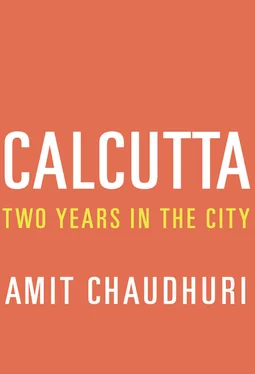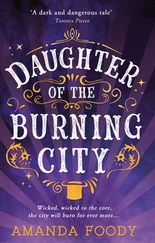But we were both fairly sure we were happy to give our daughter the childhood I’d never had, a Calcutta childhood; I’d intuited that, for the middle-class child at least, a Calcutta childhood is still a wonderful thing. It’s a city that (and my wife confirms this) lends itself to make-believe, if you’re open to make-believe, and to the kind of illusions precious to children. If you’re the more hard-headed kind of child, there’s also the rat-race to respond to, given the exacting emphasis the city’s secondary education system gives to exams; but, despite this — or because of it — there’s ample space for daydreaming.
Putting off Norwich for a year, I see what a nuisance my father has become. Unsurprisingly, he was once the man we all depended upon. The CEO of a major company, a man of calm and integrity, a foil to my mother’s impetuousness, he had, after retirement, become my accountant. Six years ago, I had to wrest this responsibility from him gently, and give it to a professional. Today, he spends his spare time (when he’s not staring at Bengali soaps, or “serials” as they’re called here, and lying in bed) on the chair in the sitting room, his largely useless walker (since he can hardly walk a step without fear of falling) and his daytime carer by his side — he a sort of chowkidar, a gatekeeper, wearing a polite, abstracted expression. His main mission (as is my mother’s) is to protect our daughter from us. The faraway look is misleading; even a whispered reprimand from us to our daughter can stir him to a fury. Equally, my daughter is my father’s chowkidar. When he makes a move to get up, she raises the alarm as if the house is on fire. Ordinarily, she’s utterly lax, and notices nothing. But it’s clear that something deep-seated in her knows my father has poor short-term memory; that he falls almost each time he rises from his chair and, positioning himself against the walker, makes off for somewhere in his low-headed precarious way; knows, too, that he’ll have no memory of the fall after twenty minutes. So the house is in a constant state of tension, my daughter preternaturally anxious for my father’s welfare, my mostly incoherent father anxious that she may be under attack — from us, her parents and lifelong enemies. “The mad led by the blind”: that’s how a well-known city academic, Prof. Sibaji Bandyopadhyay, quoting King Lear , once mildly described to me Calcutta’s middle class. Also, children leading the old, and vice versa.
* * *
Speaking with Sandip Roy confirmed for me what I’ve long known — that my experiment isn’t singular — that all kinds of people (professors of history, gay couples, critics in “cultural studies,” rock guitarists, journalists, bankers) are living here with parents or parents-in-law either because they think someone has to, or as a filial duty — some returning to the city to be with them out of a sense of obligation. Naturally, the pressure of obligation or duty is felt most strongly by the only child, perhaps the Bengali only child. This makes Calcutta an odd kind of city at least where a few people are concerned — that they are drawn to it not by work or opportunity, but some other, atavistic concern. Bombay is about money; Delhi about power; Calcutta is about parents — the three cities can’t really be compared to one another. Perhaps Banaras is a better analogue of my Calcutta at the moment: a place where people come to be facilitated into the afterlife, while their children and relatives hover there primarily to perform the necessary preparations for that journey. Certainly, it seems a whole bunch of corporate executives, surgeons, doctors, officers in the armed forces, professors, who’d all lived in other parts of the country during their working lives, returned quietly, in the last three decades, to Calcutta after retirement, just as widows, at one time, used to make their way to Banaras, or Kashi, for contemplation and solitude. And at least some of the children of those who’ve returned follow them to this city to enable their parents to be easeful before they’re finally, one day, gone. The other such person I met, besides Sandip Roy, is Devakinandan Chatterjee, whom I’ve mentioned before in passing, earlier a wealth manager with Standard Chartered Bank in Bombay, now with Citibank, an only son but not an only child, who suddenly moved to Calcutta in 2010 with family because his father was falling down and hurting himself. Of course, he continued to be a wealth manager — but the stakes here are significantly lower. In that sense (at least where the middle class is concerned), Calcutta is no more a karmasthal —the old Sanskrit word for a place where people go traditionally to seek work or employment. It has some other, hidden dimension to it — which makes it not quite Banaras, admittedly, but not quite Bombay or New Jersey either. When I bring up that ancient, forgotten, resonant term to my mother — a term that encompasses so much: life’s endeavour; human ambition — she says without hesitation: “Your karmasthal is East Anglia.” Ah, yes. What I do in Calcutta — writing, music — can’t be counted as work . “Calcutta is your basasthan ,” my mother informs me — that is, my place of habitation. More likely, it’s her basasthan; for me, it’s a place of work, and that work comprises my parents. Not that I can give my parents, or work, much time, because of my writing and music. Still, they are a reason — a compulsion — not to pack our bags and leave. Visiting a city that was not my karmasthal, our visits to our parents tended to grow longer; till we now live here. I have become the figure in the de Chirico painting.
I put to R Sandip Roy’s remark that Calcutta’s main concern is “Will you be eating at home this evening?” She concurs; and adds, “Also, all the studies we never did at school, and have to now.” My daughter’s schoolbooks are scattered around her on the bed. The rat race of secondary education means that the business of gathering knowledge in Calcutta is a traumatic family affair, involving and exhausting everyone at home, like a delinquency, a disability, or a teenage pregnancy. The only one who seems unaffected by this — at least, if our daughter is in any way representative — is the student herself. She alone sees, with a clarity of vision we no longer have, the irrelevance of the present education system. We, instead, are learning up her syllabus in large gulps; going over it with her, but more intent on mastering it ourselves than checking if she’s grasped it. We have now perfectly understood balancing equations in chemistry, the valency of elements and metals, we are quite adept at the congruencies of triangles, it wouldn’t be an exaggeration to say that the definitions of velocity and force are on our fingertips, we know, of course, that the Andes are fold mountains, in part like the Appalachians, which have a decisive climatic influence on North America. How much of this our daughter knows at the moment is uncertain; but living in this city means we have it by heart. The school itself doesn’t dispense education; it holds classes and periodically hosts exams. We, at home, don’t dispense education either, but find ourselves getting thoroughly educated. Almost everyone employs private tutors, especially for maths and that increasingly neglected tongue, Bangla; we’re no exception. The private tutor is like someone out of another age, country, and genre; he belongs to the world of Little Dorrit . He is intensely interesting, either garrulous or shy, and we choose to know little about him. My daughter has had two private tutors for maths, a subject she’ll probably never think about again in five years, or at least until she has children of her own. The first is Rajiv, a thin man with a beard, about whom one of my daughter’s friends observed: “He’s your maths teacher? He looks like a poet.” Rajiv is in his mid-fifties, and was once a quasi-Naxalite; he now runs a small advertising company. I would put him in the class of “loquacious” private tutors — he’s even played a small but significant role in a well-received art film, where he’s a sort of political busybody, a functionary who tries to lord it over a vanishing neighbourhood: someone very unlike himself, and yet a character who’s a surprisingly convincing alter ego for Rajiv. The second tutor, Alok, I place in the “shy” category: highly accomplished, if awkward, he was doing a PhD in maths at what is probably India’s leading institution for research in the sciences, the Tata Institute for Fundamental Research. He then placed his doctorate on hold and returned to Calcutta because his father is severely debilitated by back problems, and he’s an only child. He’s now taken upon himself the task of consolidating my daughter’s shaky maths knowledge. It was he who made me think of Dickens; of how uniquely dated and specialised his profession, which we take for granted in India and especially in Calcutta, really is. Many private tutors are exceptional students who, for one reason or another — family; temperament; in some cases, I sense, a resistance to worldliness — haven’t made the logical transition to glittering careers. It sometimes seems, when they dutifully appear, that they have no homes (though of course they do); that they’re destined to linger and ruminate in others’ houses. Their wards’ childhoods pass with an unusual rapidity, like the quick, busy frames of the early movies, from month to month, term to term; while their days have, at least in these years of our children’s education, a relatively detached stillness.
Читать дальше












